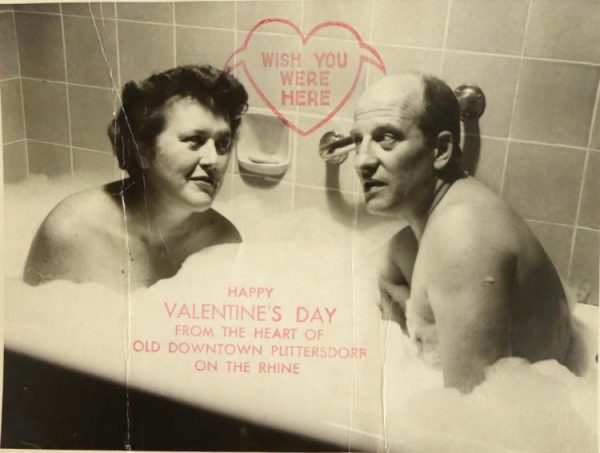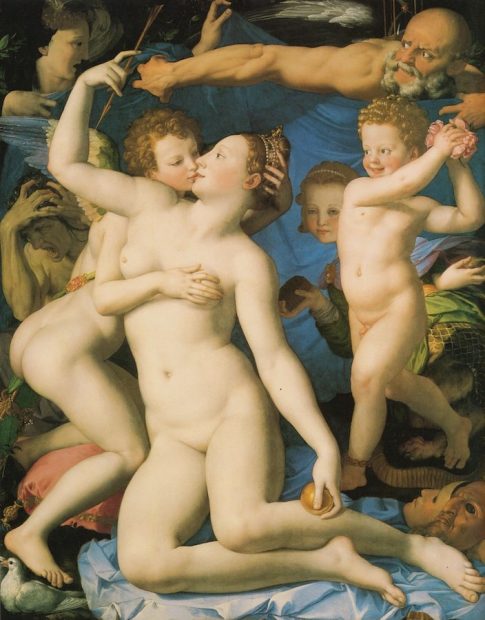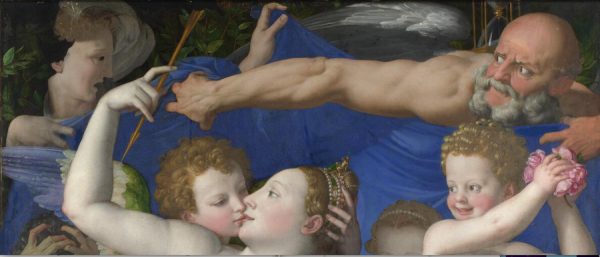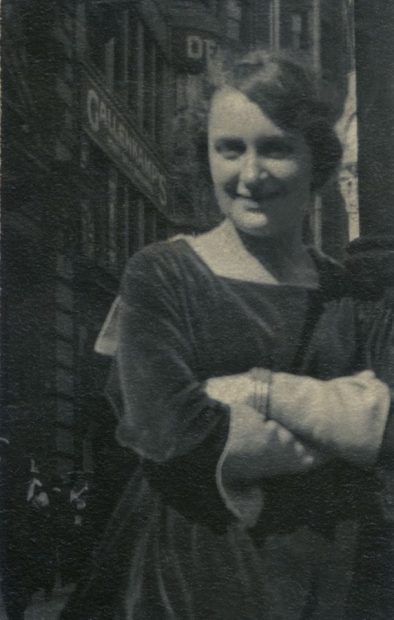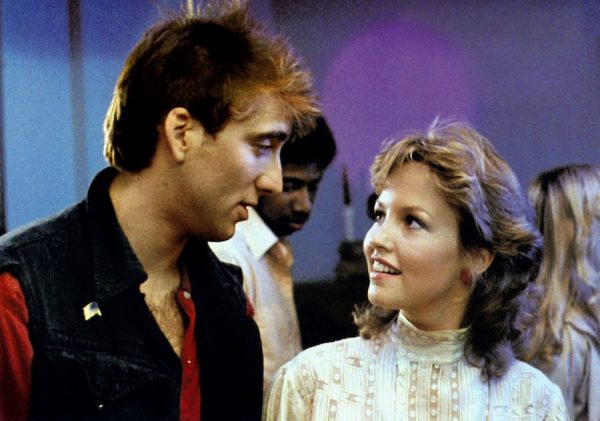Ed. note: A few weeks ago, Glasstire’s William Sarradet proposed an art-centric staff- and contributor-sourced feature focused on love and longing. Happy Valentine’s Day, readers.
Today, let’s celebrate art’s penchant for the longing heart. Desire, pining, unrequited love — it goes by many names. On this day, the unresolved feelings of want deserve just as much recognition as the more conventional, happily-partnered feelings we find thoroughly indexed in our greeting cards.
We gathered Glasstire staff and some of our contributors to each offer up one or two of our favorite artworks and creative impulses that cover a range of what “love” and “desire” mean to us.
-William Sarradet
****
Christopher Blay
Two Capsules: One Scene, One Verse
One Scene:
Two lovers, injured and condemned to a certain death in the middle of a desert, in a moment of clarity, begin:
Katharine Clifton: Why did you hate me?
Count László de Almásy: What?
Katherine: Don’t you know you drove everybody mad?
Count László: Shhh… don’t talk.
Katharine: You speak so many bloody languages and you never want to talk.
Count László: You’re wearing the thimble.
Katharine: Of course, you idiot. I always wear it… I’ve always worn it. I’ve always loved you.
-Dialogue from The English Patient, the 1996 movie starring Ralph Fiennes and Kristin Scott Thomas, directed by Anthony Minghella.
One Verse:
A single string strums an intro for four full measures — a heart peeking through a door with anticipation and mystery. Beth Gibbons’ voice trails in, the only other sound in the room. The flesh is so fragile — and even more fragile: the heart. To bare it, exposed, is a full wager. It could fall or it could break; the cost of getting is dying, to live.
Portishead’s “Over” (1997) is a heart realizing that it is in the quick of love, without a plan. “I can’t hold this day anymore,” “I can’t mold this stage anymore,” “To tread this fantasy, openly, what have I done?”
****
Ruben Cordova
Agnolo di Cosimo Bronzino, Allegory with Venus, Cupid, and Time, c. 1545, oil on wood, 146 x 116 cm, National Gallery, London
Bizarre, kinky, provocative, and stuffed with sexual symbolism, this multifarious Mannerist masterpiece — possibly a gift to a French King — takes perversion to royal heights. A contorted Cupid kisses his mother Venus while fondling her breast and attempting to steal her jeweled crown. His buttocks appear invitingly receptive. The Goddess of Love, in turn, slips him some tongue while she steals an arrow and holds her golden apple, the bribery-bought prize that launches the Trojan War. The cold, marmoreal flesh of this incestuously aloof couple is framed by Lapis Lazuli blue, the color of honor that normally cloaks the Virgin Mary.
Jealously (or Syphilis) clutches his head and screams. Deceit has a beautiful face and offers a sweet honeycomb. But she has a dragon’s body and a poisonous stinger. A youthful figure strides in carrying rosebuds and inadvertently steps on thorns — the price he pays for his innocence. At the top, Father Time struggles with Oblivion (or Night, who attempts to cloak the scene). Love causes deceit, theft, pain, jealously, disease, and war.
****
Hannah Dean
Frozen II (2019)
I can feel the collective eye roll, but hear me out! There is a moment in this mega-blockbuster Disney kids’ movie where a dude swoops in to his gal’s aid, and says: “I’m here — what do you need?” Sadly, radical.
Also, Elsa has a whole self-love evolution in this movie. I actually cried in the parking lot after the movie because the heroines and heroes I grew up with were so flat and pathetic and simpering and chauvinist and… you get it. They were tears of relief that maybe the love stories that are going wedge themselves into my daughter’s brain won’t completely suck.
Julia and Paul Child
Julia and Paul Child’s dorky valentine postcard photographs are sweet and weird and have a whiff of scandal. Paul Child’s photographs of Julia are great, especially the one of her bent over talking on the telephone — legs for days, and the voyeurism of the camera make this an especially intimate photograph.
****
Neil Fauerso
Harry Dean Stanton’s monologue in Paris, Texas (1984)
Paris, Texas is one of the greatest syntheses of cinematic talent — directing by Wim Winders, screenplay Sam Shepard, cinematography by Robby Muller, score by Ry Cooder, and the lead performance by Harry Dean Stanton operating on the same, reflective, cosmic, achingly sad wavelength of the American myth of freedom, the west, the romance of the outlaw. Stanton plays a broken man wandering in the desert; the source of his brokenness is finally revealed in a lengthy monologue to his lost wife (Nastassja Kinski) at seedy and surreal peepshow.
Stanton recalls their relationship as if it were people he once knew, capturing how an ended relationship feels entirely separate from oneself, alien, a half-remembered dream. The dynamics of their relationship are archetypal (and patriarchal), he is the much older vagabond whose love drives him mad with jealously and rage, but Shepard’s words and Stanton’s delicate performance are so filled with a beautiful (and yes, romantic) melancholy you can’t help but be swept away. This is the inevitability of all things after all, but it still stings.
****
Gene Fowler
I recently longing-ed into the romance of photographer Dorothea Lange and painter Maynard Dixon, through a Lange biography by Linda Gordon and a novel by Elise Hooper. Though 20 years older, the “graceful and irreverent” cowboy artist with “elegant hands” became “bohemian royalty” in Roaring Twenties San Francisco with the society portrait photographer who wore a beret on her bobbed hair above her trademark emerald green attire. “In his embrace,” Dorothea oozed in the novel, “I loosened like a flower blooming in the warmth of indoors.”
Their passions wilted during the Depression, as Dorothea found her own artistic voice and new love in a “maverick economist” and social worker.
****
Betsy Huete
Unpopular opinion? I think the sex scene in Blue is the Warmest Color (2013) is not only NOT an objectification of women, it is the most intimate love scene between women since Je Tu Il Elle. Unlike the heavy-handedness of close-up shots of skin and lips we see in most American films, the shot is pulled back and heavily lit, like a stage set. It makes us aware and self-conscious as viewers; it makes us unwelcome voyeurs. That discomfort not only heightens the erotic transgression in the scene, it separates us from the actors, which heightens their intimacy — as if they are really are in their own little world.
****
Christina Rees
Movie: Valley Girl (1983); Song: “A Million Miles Away” (The Plimsouls, same year)
Valley Girl is probably my favorite movie, which I don’t feel so terrible about because it’s really the Romeo and Juliet story set in early-‘80s Los Angeles and it’s rated R. My friends and I were hitting puberty when we’d figured out how to get our parents to drop us off at the movies to go “see the PG” thing and we’d instead sneak into the movies we really wanted to see. Randy (the movie’s new-wave Romeo) is played by a prematurely furry and not-manic teenage Nicholas Cage. I died for him and his rock-and-roll ways. The thing is, I wanted to be him as much as I wanted him. What’s the term for that? I wanted his life.
The song in the movie most people fawn over is the excellent (and overexposed) “I Melt With You” by Modern English (played over a closing scene that recalls, hauntingly, the final scene in The Graduate). But a scene earlier in the movie — when Randy takes Julie to a properly dank and dingy rock club and the Plimsouls, a real LA band, are on stage playing “A Million Miles Away” — is when he and Julie, while bickering about authenticity, first sense their connection.
****
William Sarradet
“Life in Art” by Mojave 3 (Excuses for Travelers, 2000)
Mojave 3, the British offshoot featuring former members of Slowdive, sentimentalize the landscape of the American West like some of their European peers. The folksy traveler’s tale recounts an interaction between an exotic dancer and a fresh-faced artist who has peered behind the curtain of erotic curiosity (though I like to think that the male subject could just as easily be a dealer, or the assistant of an art collector on a road trip). The interaction is described from a sparrow’s distance, above the discussion. The dancer is peevish with how she handles the artist’s innocence, saying: “You read some books and they / Broke your heart / But you don’t know / One thing about life.” The younger man is pining for an interesting life, to someone who has lived a long one. Mojave 3 pluck flowers with their guitar while whispering the secrets of two strangers. Bonus points for being the only country song that mentions a pickup truck and it doesn’t come across as pandering.
“If You Knew” by Neko Case (The Tigers Have Spoken, 2004)
In this song, American alternative-country treasure, Neko Case, pleads and protests to a companion: “She spends her daddy’s money, and she drives her daddy’s car, and what’s crazy is the way you think that’s style.” If only we could tell those we love and long for how to read their own bad habits. Neko Case never points to herself, enunciating her qualifications as an alternative on the sidelines of love. There is a forthright argument to be made, which comes from a protective intention.
The entire album The Tigers Have Spoken is a clarion call to be heard by a helpmate who hasn’t discovered their rightful place yet. The palpitations of the guitar disguise the tears.
****
Brandon Zech
“Melrose,” by Childish Gambino (2013)
I don’t remember where I was when I first heard “Melrose.” I do remember that the song gave (and continues to give) me goosebumps. Taken for a love song, it’s perfect: a sensuous churning of bass drum and tambourine, punctuated by ethereal keyboard and wah-wah blips that move at just the right pace. Released (or, rather, tweeted to another musician) a month before the drop of Childish Gambino’s second album, the piece is an incomplete whole: in an airy, slightly strained falsetto, Donald Glover repeats a single line, “Someone gave you all my love, baby. All my love, all my love,” wishing, to no avail, for the song to fill out.
Compared to some of his other hits that I could also write about — “3005” or “Heartbeat” — the dreary-but-energetic tone of “Melrose” is what sets it apart.
A similarly touching and intimate moment in his music that stands out is the monologue in “That Power,” the final track on Glover’s first album. While “Melrose” is perhaps more implicit in the theme of unrequited love, “That Power” makes the idea, and its associated anguish, painfully clear.


